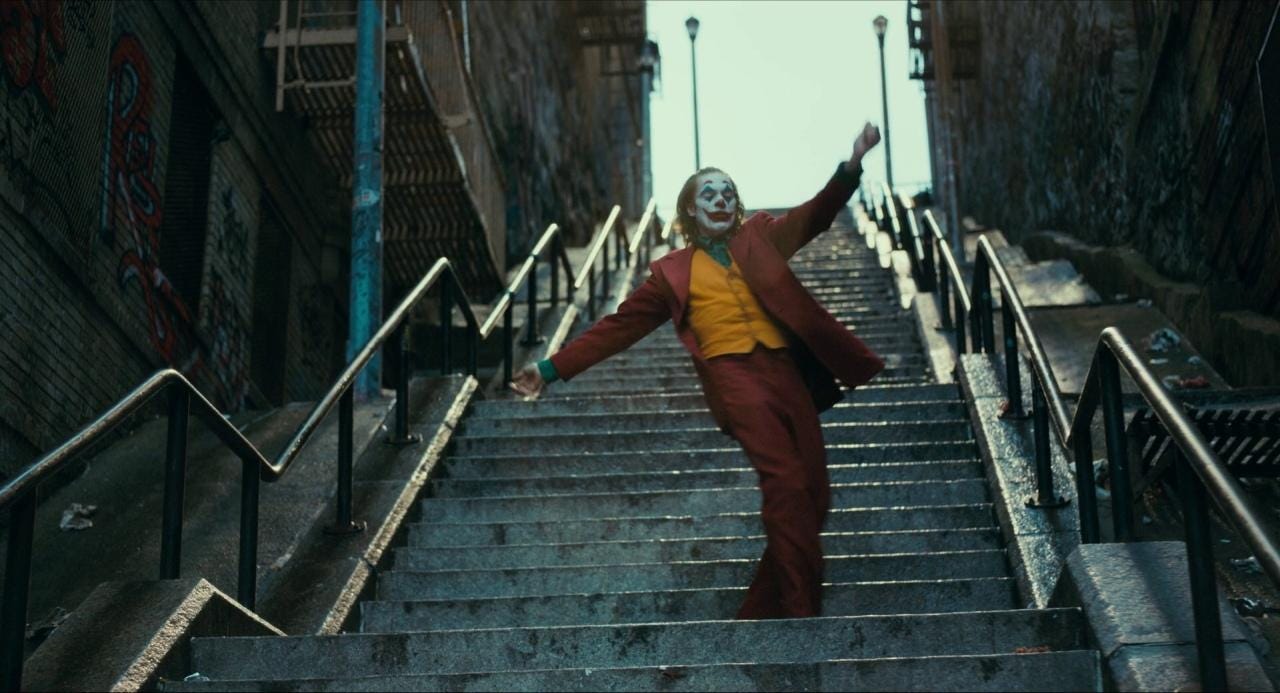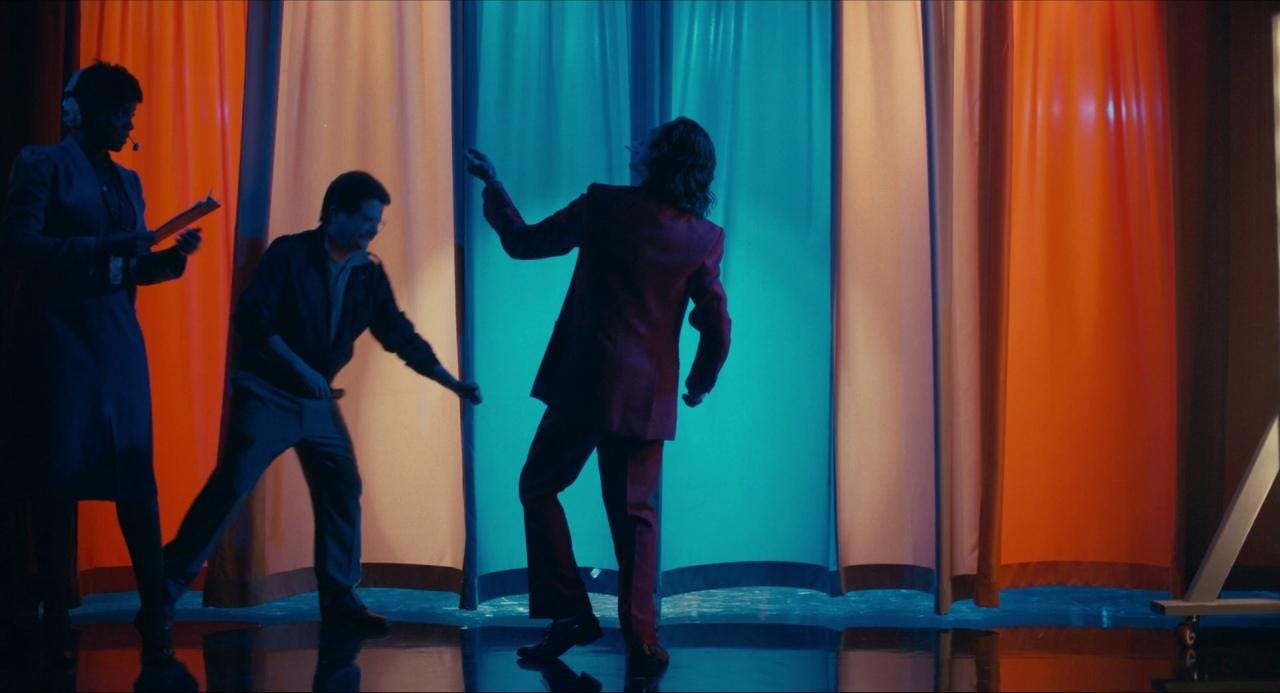Literally Me: Joker (2019)
The inaugural installment of a new column about movies featuring misplaced boys.

Welcome to the first installment of Literally Me, a monthly column dedicated to the movies that depict uncertain men in uncertain ways. Men are often dominant on the screen, but it can be easy to misunderstand them when they’re misunderstood. Either because we don’t see the forest beneath the trees or we choose not to care about their problems. I’d be taking the former path. If you want to read more of this column, please sign up or subscribe.
Literally Me is named after a meme given to a dorky-looking kid (male or female) looking at images of movie characters on his computer. “I relate to these characters, despite their large flaws,” is what’s being implied. It’s particularly cathartic to relate to men who are down on their luck. To some commentators, these people are dumb and dangerous. “They feel hurt, they hurt back,” is certainly a reactionary motivation that’s isn’t limited to the screen. It happens in real life as well, so it shouldn’t be brushed aside.
Watching movies on the regular since I was 16, I noticed that some of my favorites have been about men who feel misplaced that they have a destructive instinct as a result. These kinds of movies are immensely popular and I grew up with them. They are in the IMDb Top 250, heaped a cult following, and stay in the cinematic consciousness for a long time. That’s probably why there’s the jab of the “film bro” on social media; someone who indiscriminately favors these movies while other forms showcasing the struggles of women and minorities are indirectly neglected. As more attention is given to these movies of that nature, I believe it’s best to watch the films about these men in a proper context.
We begin with Joker, starring Joaquin Phoenix in the role of the Clown Prince of Crime, directed by Todd Phillips. It’s ranked 58 in the IMDb Top 250, and is the most profitable superhero movie ever, grossing more than a billion dollars on a budget that’s $50 to 77 million. It also revealed a cognitive dissonance in its detractors, who hate it not simply for the film, but what it could potentially represent. It’s 2019’s Cuties. It’s a culmination of everything about this new column.
The Joker is one of pop culture’s most beloved supervillains because he is the world’s most unreliable narrator. He reminds me of the evil twin of James Bond; he causes chaos whenever he goes yet doesn’t die. Rather than the mortality of the character, the ideas behind him are what’s important. He sets up elaborate stunts with an underlying intent to troll not just Batman, but everyone he meets. Joker is a result of narcissism, something that is made light of exceptionally in Alan Moore’s The Killing Joke. During the climactic battle with Batman, he asks “why don’t you see the funny side?” Why can’t people see what he sees? Probably because the backstory is possibly bullshit.

The Killing Joke’s ethos is the basis of Joker, but Todd Phillips insisted that he didn’t intend to use it specifically for inspiration. Instead, he stems from cinematic greatness, particularly Martin Scorsese and his films Taxi Driver and The King of Comedy. Both are fascinating character studies of delusion and narcissism, which overlaps with themes from The Killing Joke and Joker. The pre-Joker in The Killing Joke is a wannabe comedian desperately struggling with a pregnant wife. Rupert Pupkin is a wannabe talk show host whose delusions feed on the need to be validated by someone famous with him. Arthur Fleck is a struggling clown, whose only moment of joy is watching Murray Franklin, played by Robert De Niro reprising the Pupkin role as if he actually got successful. Travis Bickle is driven by self-hatred and New York’s dirty corruption.
The moral panic upon release was larger than the movie itself. The comments from Phillips, about his motivation behind making the movie - that he felt like comedy, his forte genre, became too woke - didn’t make him look good. The scores of journalists and critics declaring the movie an incel manifesto, when it premiered and won big at the Venice Film Festival, was unhelpful. (By the way, the idea that the character is unable to have sex is laughable, when he canonically has Harley Quinn as his right-hand). The feedback from the Aurora shooting victims in 2012 resulted in theatres issuing tighter security of screenings. As soon as it becomes nominated numerously at the BAFTAs or whatever awards ceremony, the same journos underwhelmed by the film complained that its presence snubbed a lot of other movies like *read notes* Greta Gerwig’s Little Women and Hustlers.
Phillips’s reiteration is a mosaic of many well-known movies. Taxi Driver and The King of Comedy are often cited by conversationalists as either a homage or a half-hearted imitation. Other New Hollywood films like The French Connection and Death Wish are evoked. But I mentioned that the mood, the character, and themes all remind me of Dancer in the Dark from Lars Von Trier. Both have characters in immense poverty, musical numbers play as interludes, and its leads are intensified in a role that would be difficult to look away. Both are also technically impressive. When Phillips claims he doesn’t want to follow the comic book movies, what he meant was that he wishes to enhance the visually bland aesthetic that is already homogenized by both Marvel and DC. Lawrence Sher’s cinematography making the most mundane moments more heightened and Hildur Guonadottir’s score does the job (maybe too well) of selling the “tears of a clown” theme.

There’s an underlying ambiguity that’s pleasantly embedded into the Joker origin story. While that’s all it needed, Phillips uses it as an advantage to illustrate the underlying factors to Fleck’s emergence: his self-infliction, the failings of Gotham’s healthcare system, the wealthy entertainers looking down at the underdogs, his half-hearted colleagues and impoverished mother and so on. The screenplay can make the characters and their dialogue simplistic, but Phillips’s direction manages to allow the film more poignancy.
I have written somewhere that Joker on its merits (which we’ll get into later, along with the other salient influences) reminded me of a big-budget Lars Von Trier film. But the publicity reminded me a bit of when The Revenant - from Alejandro Gonzalez Innaritu and starring Leonardo Dicaprio - first came out. While it was properly reviewed and there was no outright moral panic (although larger critiques have accused Inarritu of macho posturing), denizens of Film Twitter hated that film because it is a misuse of Dicaprio’s capabilities as an actor, and speaks to Innaritu’s creative limitations. It did result in Dicaprio winning an overdue Oscar, which feels the same as Joaquin Phoenix winning his for this one; that’s because both bring overpowered performances through method acting. Yet damn are they this committed to the bit.
There are some issues though and all of it is about how over-the-nose this was. The music choices, like with Gary Glitter on the infamous stairs, feel less menacing. As I mentioned earlier, the dialogue and soundtrack do slams to the point too much, and Phoenix’s performance needs some restraint. Those are legit critiques to be had, rather than the hysterical response from the likes of SNL to scapegoat the film as an example of “white male rage”. And for better or worst, Joker is a pastiche of pop culture featuring self-destructive men, packaged underneath a familiar franchise. How much you can tolerate that, depending on whether or not one factor resonates with you, your mileage may vary. But it’s the movie we deserve when it’s downtrodden like crap from its detractors.
Coming up next:
November 2020: La Haine
December 2020: Blade Runner 2049



